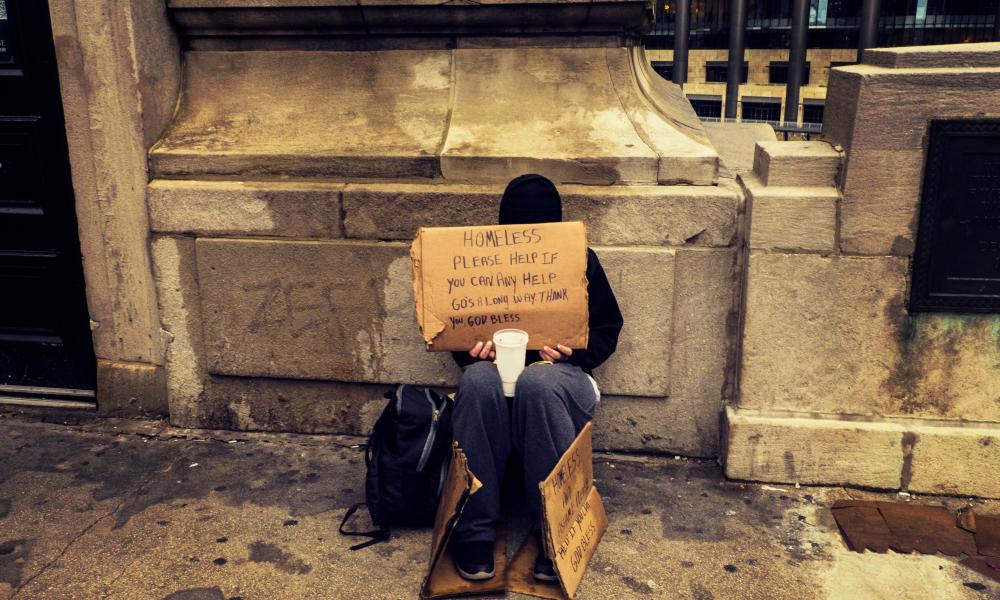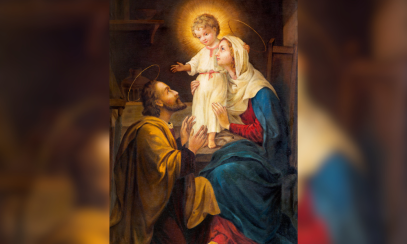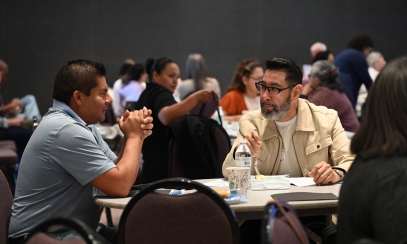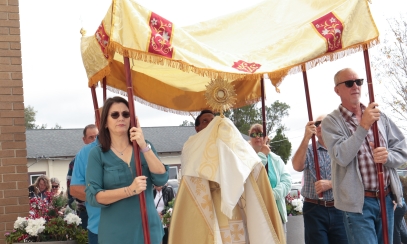
Do Our Eyes Glance Elsewhere?
In this Sunday’s Gospel, we hear of the poor man welcomed into heaven. What happened to the wealthy man is a lesson for us all.
In this Sunday’s Gospel, we hear of the poor man welcomed into heaven. What happened to the wealthy man is a lesson for us all.
September 21, 2022 | The Gospel of Luke, the Gospel of God’s compassion, the Gospel of the lowly being raised up, challenges us today with the parable of Lazarus and the Rich Man. The parable is not meant to defame those who have worked long and hard for their financial position in life. It is not meant to dump on the rich. The parable is meant to help us all recognize the responsibilities our positions in life demand.
The parable presents three areas of concern: blindness, isolation, and faithlessness.
First of all, blindness. The most terrifying statement in the parable comes at the beginning: the Rich Man is in hell. From hell he lifts up his eyes and sees Lazarus. His eyes had never met Lazarus’ eyes before. Yes, the Rich Man may have noticed Lazarus in stinky, dirty clothes begging for food as the Rich Man opened his front door to greet his guests for yet another dinner party. He may even have called the police to complain about the vagrant who was a living eyesore at his gate. But he never saw Lazarus, a man like him, only a man who was hungry.
Now, people in Jesus’ time didn’t use forks. They would dip into stew pots with bread, bite off what they wanted and just throw whatever was left onto the floor. Lazarus longed to eat the scraps that fell from the Rich Man’s table. Lazarus wasn’t even given these scraps. The dogs got them. And then the dogs went outside and licked Lazarus’ sores. The Rich Man never saw this. He never saw Lazarus as a fellow human being who had a right to be treated with dignity. His possessions made him blind to those around him. The first time that the Rich Man really saw Lazarus as a person, not as an eyesore, was when it was too late. From Hell the Rich Man looked up and saw Lazarus.
Perhaps we have walked down a street and come upon someone calling out for food or help. What are we inclined to do? Are we inclined to make believe that we do not see them? Do our eyes glance elsewhere, so we don’t meet their eyes? Or perhaps we make immediate judgments. We glance at someone and decide that this may be a drug addict, or an alcoholic, perhaps a thief, maybe someone suffering from a terrible disease that, again we make an instant judgment, has been caused by his or her own horrible choices in life. But we don’t see a person. Because we have worked hard to care for our families, we are inclined to be blind to those whom we assume have not worked for the minimal sustenance they need to survive. We are more concerned with what we have done and what they have or have not done, than we are concerned with their present needs. So, we walk by the Lazaruses of the world without even really seeing them.
Our possessions and the hard work it takes for us to obtain them can easily render us blind. Or perhaps we assume that the person is not really all that poor, but a scam artist. We may be right. But we also may be wrong.
What if that person seeking help is not a scam artist, but is Jesus Christ? Should we close our Food Pantries and our soup kitchens, and shut down all Vincent De Paul, Community Life, and similar ministries in order to prevent those who do not need them from taking advantage of us? Or should we realize that for every person who is working some sort of scam, there are many, many more who are dependent on others.
“Look and see,” the parable tells us. Look and see someone to whom we can reach out. That person, that Lazarus at our gates, might be the means for our salvation. Maybe that person was placed there by the Lord to help us get beyond the blindness inflicted by our possessions.
The parable also warns us to be concerned about being isolated. We have to be careful or our possessions will isolate us from the community. It is easy for us to form the mentality that what we have is totally and only ours. It is easy to assume that we have no obligation to others. This does not just refer to financial wealth. It refers to anything we might possess. For example, a brilliant college student may refuse to help another student whom he or she might see as possible future competition for law school or medical school. So, the student isolates himself to hoard his intellectual gifts. He gets an A in all his courses, but he flunks life.
The extreme case of those who isolate themselves to hoard their possessions is that of the miser. The miser is miserable. Or is the term, miser-able? His possessions have taken control of him. He has built up a wall to the community and lives and dies in isolation.
But does the community have a right to that which belongs to you and belongs to me? Didn’t we work hard for our positions of authority, or for the wonderful things we want to provide for our families? How can the community make a claim to what is mine?
Ultimately, all that we have belongs to someone else. That someone else is God. We are all stewards of His creation. Again, this does not just refer to possessions, it refers to intelligence, to artistic talent, to the ability to lead, etc. All that we have is ultimately God’s. It flows from Him and is only beneficial to us if it leads back to Him. We are all going to be called to give an account for all that we have been given. Here we are challenged with a frightening verse also from the Gospel of Luke, Luke 12:48: “To those who have been given much, a great account must be given.” This applies to the spiritual realm, the Grace of God we have received, and to the physical realm, our material blessings. These words are frightening because they apply to us who live in the richest and most materialistic nation in the world.
We cannot allow our possessions to isolate us from the community. The great American spiritual writer of the last century, Thomas Merton, wrote: “No man goes to heaven alone.” No woman either. We all receive our salvation as members of a community, the Body of Christ.
So, should we trust our government to add to our taxes to help the poor? Not necessarily. Our obligation to the poor does not oblige us to put our trust in organizations that are often inept, incompetent, and sometimes even corrupt.
What should we do then? We need to follow the lead of the universal Church. When he was named pope, the first words that Jorge Maria Bergoglio, the new Pope Francis, heard was a cardinal telling him, “Please remember the poor.” Our wonderful Catholic Church continually reaches out to the poor and suffering throughout the world. The work of Catholic Relief Services and the Catholic Campaign for Human Development are noted for their efficacy. It is not relevant to the Church whether the suffering are Christian or not. Cardinal Dolan from New York was once asked why the Church puts so much effort into helping those who may not be Catholic. Cardinal Dolan responded, “We don’t help them because they are Catholic. We help them because we are Catholic.” Nor is it relevant to the Church whether those suffering have brought the pain on themselves. What matters is that the Church has a responsibility to aid the suffering. The Church could not be Catholic if it did not exercise its responsibility to the total community of the world. The word catholic means universal. The Church can never be content as long as one brother or one sister cries out in vain for bread or justice or love.
Along with warning us to be careful less our possessions lead us to blindness or being isolated, the parable of the Rich Man and Lazarus warns us to be careful or our possessions will lead us to faithlessness. The one true need that we have in life is the need for purpose, for meaning for our existence. Purpose and meaning can only be found in God. But to possess God means that we have to look beyond all that is mundane. Sometimes we fight this call to love. It is too demanding for us. So, what do we do? We hide behind our stuff. We want to find meaning in the amount we have accumulated. We let our material possessions define us. We condemn ourselves to a life of futility. We condemn ourselves to our own hells.
Maybe, though, if someone were to rise from the dead, we would change our priorities. Maybe if someone were to rise from the dead we would be infinitely more concerned with the spiritual than we are with the physical. Maybe if someone were to rise from the dead we would use our gifts, our talents, our intelligence, our possessions, to reach out to the presence of God in others. “If only someone were to rise from the dead, my brothers would change their lives,” cried the Rich Man. But someone has risen from the dead. He has called us to have faith in Him instead of faith in our possessions. His name is Jesus. And we are here today to ask Him to help us to be Christians.
Monsignor Joseph Pellegrino is a retired priest of the Diocese of St. Petersburg who publishes his homilies online.



